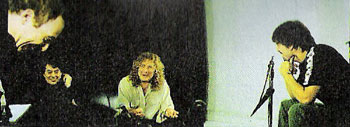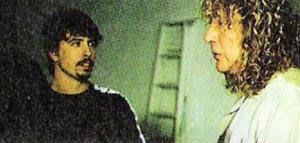Ray Gun
When Dave Grohl and Taylor Hawkins arrive, they're plainly in awe of the two men who heretofore existed only in their fantasy lives. They wear a childlike look of worship and fear on their faces. Grohl, who knows a thing or two about facing down interviewers, seems to take to his gig as rock hack seriously, he paces nervously holding a yellow legal pad loaded with questions. The three instantly bond, not over their former groups' impact on pop culture, but over inimitable producer Steve Albini

 Dave: You can have my copy if you want.
Dave: You can have my copy if you want.